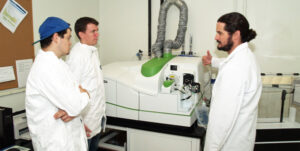
Chemical oceanographers seek to understand the nature of elements and compounds found in marine environments. The sources, sinks, and distributions of the ocean’s chemical constituents impact primary productivity and marine food webs, natural resources, and global climate.
Researchers at Skidaway Institute are experts in the study of carbon, nutrients, trace elements, reactive oxygen species, and stable isotopes. At Skidaway Institute, we investigate these chemical species and their respective cycles to further our understanding of how the ocean functions. Members of the chemical oceanography group at Skidaway Institute include:
Brandes lab – The Skidaway Institute Scientific Stable Isotope Laboratory (SISSIL), marine carbon and microplastics research
Buck lab – Trace element geochemistry
Some examples of chemical oceanographic research at Skidaway Institute include:
SkIO lab installs state-of-the-art isotope ratio mass spectrometry system
Study reveals how eel ear bones provide insights into trace metal sources on the continental shelf
UGA Skidaway Institute scientists to study aerosol dust’s impact on life and chemistry in the ocean
UGA Skidaway Institute scientists prepare for groundbreaking Arctic expedition
UGA Skidaway Institute researcher publishes paper on iron recycling in the ocean
UGA Skidaway Institute scientists investigate missing carbon mystery


